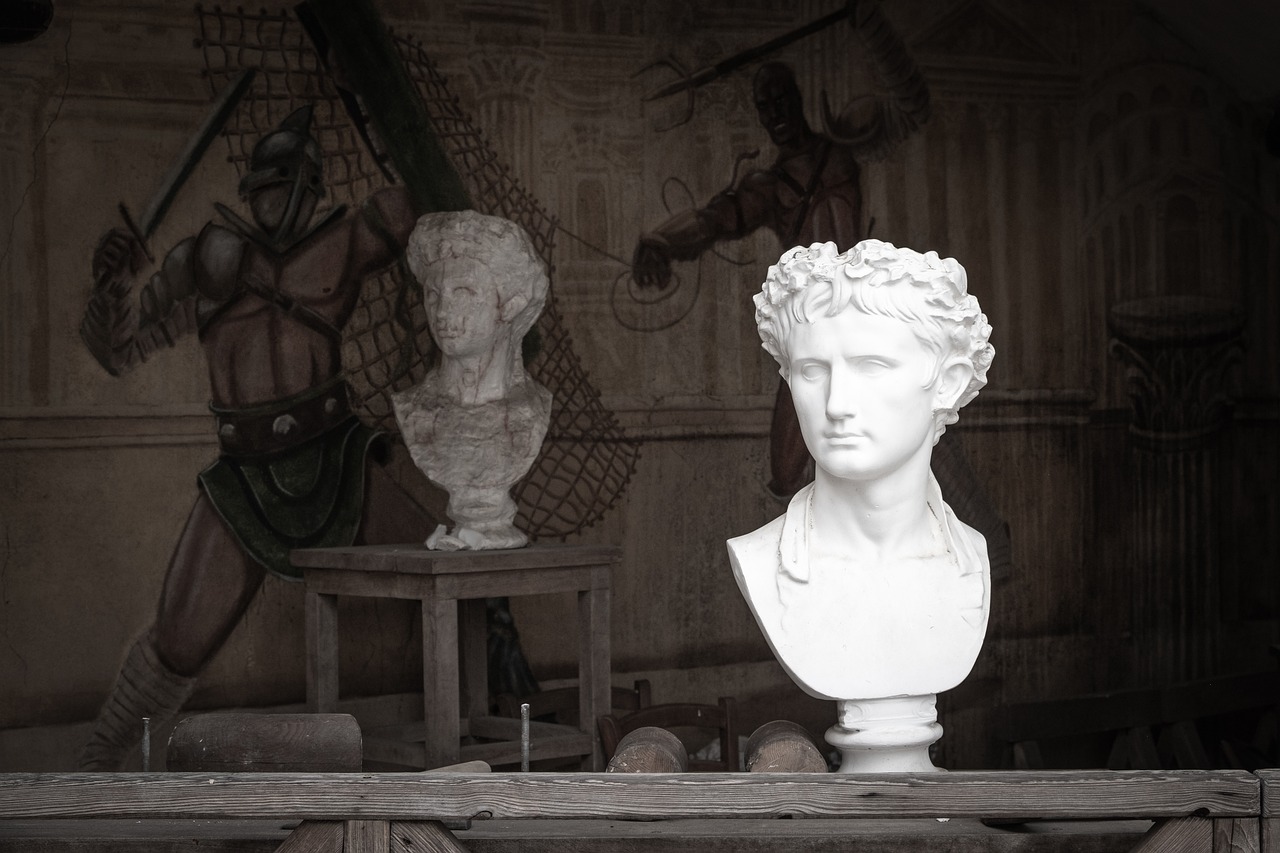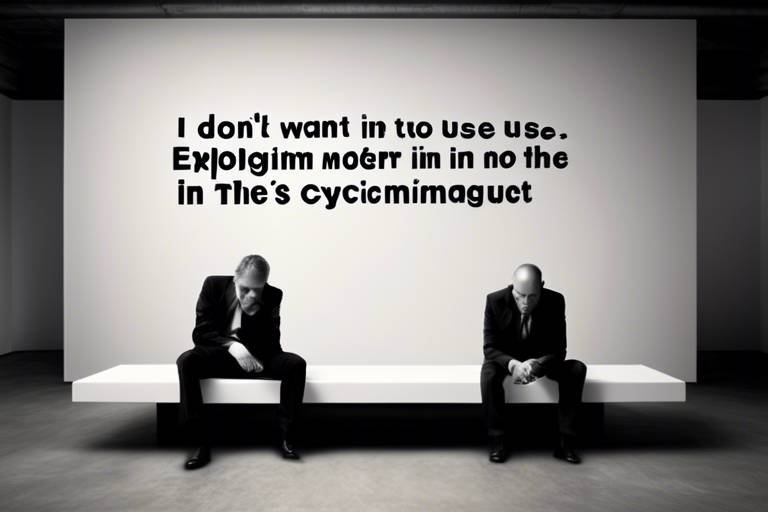Does Age Influence Our Philosophical Understanding?
The question of whether age influences our philosophical understanding is as intriguing as it is complex. As we journey through life, our experiences shape not only our beliefs but also the very lens through which we view the world. Imagine a tree—its roots represent our foundational experiences, while the branches symbolize our evolving thoughts and beliefs. Just like the tree grows and changes with the seasons, so too do our philosophical perspectives as we age. From the innocent inquiries of childhood to the reflective musings of old age, each stage of life brings with it a unique understanding of existence, morality, and the universe.
As we peel back the layers of this topic, we find that age is not merely a number; it is a significant factor that influences our reasoning and values. Young minds are often filled with a sense of wonder and curiosity, questioning everything around them. In contrast, older individuals may possess a depth of insight that comes from years of lived experiences, leading to a more nuanced understanding of complex philosophical concepts. This dynamic interplay between age and philosophical thought invites us to explore how our beliefs evolve over time and the reasons behind these transformations.
Throughout this article, we will delve into various dimensions of this relationship, examining how different life stages shape our beliefs, values, and reasoning. By understanding the philosophical perspectives across ages, we can appreciate the rich tapestry of human thought and the profound impact that age has on our understanding of life’s most pressing questions.
As individuals progress through different life stages, their philosophical views often evolve significantly. In youth, the focus may be on identity, freedom, and the quest for meaning, while middle age often brings a period of reflection and reevaluation of previously held beliefs. By the time we reach old age, many individuals engage in deep philosophical inquiries about legacy, purpose, and the nature of existence itself. It’s as if each age group wears a different pair of glasses, allowing them to see and interpret the world in unique ways.
Consider the following table that illustrates some key differences in thought processes and priorities from youth to old age:
| Age Group | Philosophical Focus | Common Questions |
|---|---|---|
| Childhood | Curiosity and exploration | What is the world? Why do things happen? |
| Adolescence | Identity and ethics | Who am I? What is right and wrong? |
| Middle Age | Reflection and reevaluation | What have I accomplished? What is my purpose? |
| Old Age | Legacy and meaning | What will I leave behind? What is the meaning of life? |
This table highlights how our philosophical inquiries shift as we age, reflecting our changing priorities and concerns. It’s fascinating to think about how our understanding of the world is shaped by our experiences and the questions we ask at different stages of life.
To further understand the relationship between age and philosophical thought, we must consider the insights from developmental psychology. This field explores how cognitive and emotional growth influences our reasoning capabilities. For instance, children often approach philosophical questions with a sense of wonder and simplicity, whereas adults may grapple with the complexities of ethical dilemmas and existential queries.
In childhood, the innate curiosity of young minds leads to profound philosophical inquiries. Children often ask questions that adults might overlook, such as, "Why is the sky blue?" or "What happens when we die?" These early thoughts lay the groundwork for their future understanding of complex ideas. It’s during these formative years that foundational experiences shape their beliefs about existence, morality, and relationships.
Education plays a crucial role in shaping young people's philosophical outlooks. Through exposure to diverse ideas and critical thinking skills, students learn to question and analyze the world around them. This educational journey is akin to planting seeds in a garden; with proper nurturing, these seeds can grow into a rich understanding of philosophical concepts that will flourish throughout their lives.
During adolescence, peer relationships become increasingly influential. Friends can shape our philosophical beliefs and ethical considerations, often leading to debates and discussions that challenge our viewpoints. The social dynamics of this age group can create a fertile ground for the exploration of identity and morality, as adolescents seek to carve out their own understanding of the world.
As individuals reach middle age, they often find themselves reflecting on their philosophical beliefs, reevaluating what they once held true. This period can lead to significant shifts in understanding as life experiences accumulate. Middle age is a time of transition, where one questions past decisions and contemplates future aspirations, resulting in a deeper and more nuanced perspective on life’s philosophical questions.
Aging is frequently associated with increased wisdom, a phenomenon that many attribute to the accumulation of life experiences. As we navigate the ups and downs of existence, we gain insights that contribute to our philosophical understanding. The challenges we face can lead to profound insights that shape our ethical reasoning and worldview.
Personal experiences play a significant role in shaping philosophical perspectives. Every triumph and challenge contributes to a deeper understanding of life’s complexities. Much like a sculptor chiseling away at a block of marble, our experiences refine our beliefs and values, ultimately revealing a clearer picture of our philosophical stance.
In old age, many individuals often engage more deeply with philosophical questions, seeking meaning and understanding in their later years. This engagement can enrich their perspectives, allowing them to share wisdom with younger generations. It’s a beautiful cycle of learning and teaching, where the insights gained through a lifetime of experiences can illuminate the path for others.
In conclusion, age indeed plays a crucial role in shaping our philosophical understanding. As we traverse through different life stages, our experiences, education, and reflections contribute to the dynamic interplay of beliefs and values. The journey of philosophical thought is not linear; it’s a rich tapestry woven from the threads of our lives, each stage adding depth and complexity to our understanding of existence. Understanding this relationship not only enriches our own philosophical inquiries but also fosters empathy and connection across generations.
- Does age really change how we think philosophically? Yes, age can significantly influence our philosophical perspectives as life experiences shape our beliefs and values.
- What role does education play in philosophical understanding? Education enhances critical thinking and exposes individuals to diverse ideas, which can profoundly impact their philosophical outlook.
- How do life experiences shape our philosophical views? Life experiences provide context and depth to our understanding, often leading to profound insights and shifts in beliefs.
- Is wisdom solely a product of aging? While aging is often associated with wisdom, it is primarily the accumulation of experiences and reflections that contribute to deeper philosophical insights.

Philosophical Perspectives Across Ages
As we journey through life, our philosophical perspectives undergo a remarkable transformation. Imagine starting life as a blank canvas, where each experience, each interaction, and each moment adds layers of color and depth to our understanding of the world. In our youthful years, we often perceive the world through a lens of curiosity and wonder. We ask questions like, “What is the meaning of life?” or “Why do people behave the way they do?” These inquiries are often driven by an innate desire to understand our surroundings and our place within them.
However, as we transition into adolescence, our philosophical inquiries become more nuanced. During this stage, we start to grapple with complex ideas about morality, identity, and existence. The world no longer appears as a simple playground; instead, it morphs into a complex web of ethical dilemmas and social dynamics. The influence of peers becomes significant, as we seek validation for our beliefs and challenge the status quo. This is when many begin to form their personal philosophies, often shaped by the cultural and social contexts in which they find themselves.
Moving into middle age, many individuals experience a profound period of reflection. Life experiences, both positive and negative, accumulate like a rich tapestry, prompting a reevaluation of previously held beliefs. Questions that once seemed trivial may take on new significance, as we ponder the implications of our choices and the legacy we wish to leave behind. It’s a time when philosophical thought can deepen, as individuals consider not just their own lives but also the broader human experience.
Finally, in our later years, wisdom often blossoms from the fertile ground of lived experience. Older adults frequently engage with philosophical questions on a deeper level, seeking meaning and understanding in the twilight of their lives. They may reflect on their past, drawing connections between their experiences and broader existential themes. This engagement can lead to rich discussions about ethics, purpose, and the human condition, often enriching their perspectives and those of others around them.
In summary, the evolution of our philosophical perspectives is a dynamic process influenced by age and experience. From the innocent questions of childhood to the profound reflections of old age, each stage of life offers unique insights that shape our understanding of the world. Just as a tree grows stronger and more intricate with age, so too do our philosophical beliefs mature, reflecting the complexity of human existence.

Developmental Psychology and Philosophy
The fascinating intersection of developmental psychology and philosophy reveals how our cognitive and emotional growth influences our philosophical reasoning throughout various life stages. As we journey through life, our understanding of complex ideas evolves, shaped by both internal and external factors. Imagine a tree growing—its roots represent our early experiences, while the branches symbolize the diverse thoughts and beliefs we develop over time. This analogy encapsulates how our philosophical outlook is nurtured and expanded as we age.
At the core of this relationship lies the concept of cognitive development. According to renowned psychologists like Jean Piaget, children move through distinct stages of cognitive growth, each characterized by different ways of understanding the world. For instance, during the preoperational stage, children engage in magical thinking, often struggling with the concept of reality versus fantasy. As they transition into the concrete operational stage, their ability to think logically about concrete events begins to flourish, allowing them to grasp more complex philosophical concepts.
Moreover, emotional development plays a pivotal role in shaping our philosophical beliefs. As we navigate through life's ups and downs, our emotional intelligence matures, enabling us to approach philosophical questions with greater empathy and insight. For example, a young adult grappling with the concept of justice may focus on fairness as a principle, while an older adult may consider the broader implications of justice, such as societal impact and historical context. This evolution in thought reflects a deeper understanding, influenced by life experiences that enrich our philosophical inquiries.
To illustrate this interplay between developmental psychology and philosophy, let’s consider the following table:
| Life Stage | Cognitive Development | Philosophical Inquiry |
|---|---|---|
| Childhood | Concrete thinking; magical beliefs | Questions about fairness, existence, and identity |
| Adolescence | Abstract reasoning begins | Exploration of moral dilemmas and personal values |
| Middle Age | Critical thinking; reflective judgment | Reevaluation of life’s meaning and legacy |
| Old Age | Wisdom and insight | Deep engagement with existential questions |
As we can see, each life stage brings unique cognitive abilities that shape how we engage with philosophical concepts. In childhood, the questions may be simple yet profound, while in old age, they can be complex, reflecting a lifetime of experiences and reflections. This dynamic nature of our philosophical understanding is a testament to the continuous growth and change that characterizes human life.
Ultimately, the relationship between developmental psychology and philosophy is a rich tapestry woven from the threads of our experiences, emotions, and cognitive abilities. As we traverse the various stages of life, we not only accumulate knowledge but also cultivate a profound understanding of the world around us. This interplay invites us to consider: how does our personal journey influence our philosophical beliefs, and how might our evolving perspectives shape our future?
- How does age affect philosophical thinking? Age influences philosophical thought by shaping our experiences, cognitive abilities, and emotional understanding, leading to a deeper engagement with complex ideas.
- What role does education play in philosophical development? Education enhances critical thinking and exposes individuals to diverse ideas, which can significantly impact their philosophical outlook.
- Can philosophical beliefs change over time? Yes, philosophical beliefs often evolve as individuals gain new experiences and insights throughout their lives.

Childhood and Early Philosophical Thoughts
Childhood is a fascinating period where the seeds of philosophical inquiry are often sown. During this time, children display an innate curiosity about the world around them, leading them to ask profound questions that adults sometimes overlook. Have you ever noticed how a child can turn a simple observation into a deep philosophical discussion? They might ask, "Why is the sky blue?" or "What happens when we die?" These questions, while seemingly innocent, reflect a budding philosophical mind grappling with complex concepts.
In these formative years, children are not just passive recipients of information; they actively engage with their surroundings, forming their own understandings of morality, existence, and relationships. This stage of life is characterized by a unique blend of imagination and inquiry, allowing them to explore ideas without the constraints often imposed by adult reasoning. For instance, a child might imagine a world where animals can talk or where time flows backward, illustrating their ability to think outside the box. This imaginative play is not just for fun; it's a crucial part of their early philosophical development.
Moreover, the influence of foundational experiences during childhood cannot be overstated. Whether it's a family discussion around the dinner table, a thought-provoking book, or a significant life event, these experiences shape their early philosophical thoughts. Children learn to navigate ethical dilemmas through stories and interactions, which lay the groundwork for their future understanding of complex ideas. For example, a child witnessing an act of kindness may ponder the nature of goodness, while a conflict among friends might prompt questions about justice and fairness.
As they grow, the role of education becomes increasingly important in shaping their philosophical outlook. Schools introduce children to various disciplines, encouraging critical thinking and exposing them to diverse ideas. This educational exposure can either reinforce or challenge their early beliefs, prompting them to reevaluate their understanding of the world. The classroom becomes a microcosm of philosophical exploration, where discussions can lead to a deeper appreciation of different perspectives.
Peer influence also plays a significant role during childhood. As children interact with their friends, they share ideas, challenge each other's views, and collectively navigate the complexities of ethical and philosophical questions. This social dynamic can lead to a rich tapestry of beliefs that are continuously evolving. For example, a child might adopt a friend's viewpoint on fairness, which can either solidify or shift their own understanding of justice.
In summary, childhood is a critical period for philosophical thought, marked by curiosity, foundational experiences, educational influences, and peer interactions. These elements combine to create a fertile ground for developing a philosophical mindset that can last a lifetime. As we consider the evolution of philosophical understanding, it becomes clear that the early years are not just about learning facts; they are about cultivating a way of thinking that encourages lifelong inquiry.
- What role does curiosity play in childhood philosophy? Curiosity drives children to ask questions and seek answers, forming the basis of their philosophical inquiries.
- How can parents encourage philosophical thinking in children? Engaging in open discussions, asking thought-provoking questions, and exploring diverse ideas can foster a child's philosophical development.
- Do children's philosophical thoughts change as they grow older? Yes, as children gain more experiences and education, their philosophical thoughts often evolve and mature.

Influence of Education on Young Minds
Education plays a pivotal role in shaping the philosophical outlook of young minds. From the moment children step into a classroom, they are exposed to a myriad of ideas, beliefs, and critical thinking skills that challenge their innate curiosity. This exposure is not just about memorizing facts; it’s about learning to question, to analyze, and to engage with the world around them. Imagine a young child, wide-eyed and eager, sitting in a classroom filled with the vibrant colors of knowledge. Each lesson is like a brushstroke on the canvas of their mind, painting a picture of understanding that will evolve as they grow.
One of the most significant impacts of education is its ability to cultivate critical thinking. Young students learn to dissect arguments, evaluate evidence, and form their own conclusions. This process is akin to training for a mental marathon, where they build endurance in reasoning and analysis. As they progress through their educational journey, they encounter various philosophical frameworks, from ethics to existentialism, encouraging them to grapple with profound questions such as, "What is the meaning of life?" or "What is right and wrong?"
Moreover, education exposes children to diverse perspectives, allowing them to interact with ideas that may differ from their own. This exposure is crucial for developing empathy and understanding. For instance, consider a classroom discussion on cultural relativism, where students explore various moral frameworks. This not only broadens their horizons but also instills a sense of respect for differing beliefs, which is essential in our increasingly interconnected world.
However, the influence of education is not uniform. It varies significantly based on several factors, including the quality of education, the curriculum, and the socio-economic background of the students. High-quality education can foster an environment where students feel safe to express their thoughts and challenge assumptions. In contrast, a lackluster educational experience might stifle creativity and critical inquiry, leading to a more rigid worldview.
To illustrate the varying influences of education, let's take a look at a simple table that outlines different educational approaches and their potential impacts on philosophical thinking:
| Educational Approach | Potential Impact on Philosophy |
|---|---|
| Traditional Learning | Focus on rote memorization; limited critical engagement |
| Inquiry-Based Learning | Encourages questioning and exploration of ideas |
| Experiential Learning | Connects theory with real-world experiences, deepening understanding |
| Interdisciplinary Studies | Fosters connections between different fields, enhancing critical thinking |
In conclusion, education serves as a powerful catalyst for philosophical development in young minds. It shapes not only what they think but also how they think. As they navigate through their formative years, the lessons learned in the classroom can profoundly influence their beliefs, values, and ethical considerations. The seeds of philosophical inquiry planted during these years can blossom into a lifelong journey of exploration and understanding.
- How does education impact critical thinking in children? Education encourages children to analyze information, question assumptions, and develop their reasoning skills, which are essential for critical thinking.
- What role do teachers play in shaping philosophical views? Teachers act as facilitators who guide discussions, challenge students' thinking, and introduce diverse perspectives that can influence students' philosophical outlooks.
- Can informal education also influence philosophical understanding? Absolutely! Experiences outside the classroom, such as family discussions, community engagement, and personal experiences, significantly contribute to shaping one's philosophical beliefs.

Peer Influence in Adolescence
During adolescence, the impact of peer influence becomes a powerful force in shaping philosophical beliefs and ethical considerations. This period is marked by a transition where young individuals begin to forge their identities, often looking towards their peers for validation and guidance. Have you ever noticed how a teenager’s opinion can shift dramatically based on who they’re hanging out with? It’s fascinating how social dynamics can lead to profound changes in thought processes.
Adolescents are particularly susceptible to peer pressure, which can manifest in various ways. It’s not just about wanting to fit in; it’s about aligning one’s beliefs and values with those of their social circle. For instance, a teenager who is surrounded by friends who prioritize environmental issues may develop a stronger sense of responsibility towards sustainability. Conversely, if their peers exhibit a carefree attitude towards such topics, that teenager may also adopt a more indifferent stance. This highlights the fluidity of philosophical understanding during these formative years.
Moreover, peer groups often serve as a sounding board for discussing complex ethical dilemmas. Adolescents engage in debates about morality, justice, and personal values, which can significantly influence their philosophical outlook. These conversations can range from light-hearted banter to serious discussions about societal issues, and they often help shape a young person’s worldview. The ability to articulate one’s thoughts in a peer setting fosters critical thinking skills, which are essential for developing a robust philosophical framework.
To illustrate the impact of peer influence, consider the following factors:
- Social Validation: Adolescents often seek approval from their peers, which can lead to the adoption of shared beliefs.
- Exposure to Diverse Ideas: Different peer groups can introduce varying philosophical perspectives, enriching an adolescent’s understanding.
- Conflict and Resolution: Disagreements among peers can prompt deeper reflection and reevaluation of one's values.
In conclusion, peer influence during adolescence plays a crucial role in shaping philosophical perspectives. As teenagers navigate their social worlds, they are not just absorbing ideas; they are actively engaging with them, questioning, and refining their beliefs. This dynamic interaction with peers fosters a rich environment for philosophical growth, laying the groundwork for their future understanding of complex ideas.
Q: How does peer influence affect ethical decision-making in adolescents?
A: Peer influence can significantly shape an adolescent's ethical decision-making by providing a context for discussions about right and wrong. When surrounded by peers who value honesty, for example, an adolescent is more likely to adopt similar values.
Q: Can peer influence have negative effects on philosophical development?
A: Yes, negative peer influences can lead to the adoption of harmful beliefs or behaviors. For instance, if a peer group promotes unethical behavior, an adolescent may feel pressured to conform, potentially stunting their philosophical growth.
Q: What role do parents play in moderating peer influence?
A: Parents can help moderate peer influence by encouraging open communication and critical thinking. By discussing values and beliefs at home, parents can provide a strong foundation that adolescents can rely on when faced with peer pressure.

Middle Age: Reflection and Reevaluation
As we journey through life, the middle age phase often serves as a significant turning point—a time when many individuals engage in deep reflection and reevaluation of their philosophical beliefs. This period, typically spanning from the late 30s to the early 60s, is characterized by a unique blend of experiences that shape our understanding of the world. Have you ever noticed how your perspective shifts as you accumulate life experiences? In middle age, this shift becomes particularly pronounced.
During this phase, individuals often find themselves at a crossroads, contemplating their past choices and future aspirations. The weight of responsibilities—be it career pressures, family obligations, or societal expectations—can lead to a profound reassessment of what truly matters. It's not uncommon for people to question the values they once held dear, pondering whether those beliefs still resonate with their current reality. This process of introspection can be both enlightening and daunting, as it prompts individuals to confront the complexities of their existence.
Moreover, middle age is often laden with life-altering experiences, such as career transitions, children leaving home, or even the loss of loved ones. These events serve as catalysts for philosophical engagement, pushing individuals to seek deeper meanings in their lives. For instance, a person who once prioritized financial success may begin to value relationships and personal fulfillment more highly after experiencing a significant life change. This reevaluation is not merely a fleeting thought; it can lead to lasting changes in one's worldview, influencing how they interact with others and approach life's challenges.
Research in developmental psychology supports the idea that this phase of life is crucial for philosophical growth. Studies suggest that middle-aged individuals often display enhanced cognitive flexibility, allowing them to entertain multiple perspectives and engage in more nuanced ethical reasoning. This cognitive shift can be attributed to the accumulation of life experiences, which enriches one's ability to empathize with others and understand complex moral dilemmas.
In essence, the middle age phase is a fertile ground for philosophical exploration. It is a time when individuals can embrace the dynamic nature of their beliefs, recognizing that change is not only natural but also essential for personal growth. As they navigate through this transformative period, they may find themselves drawn to new philosophies or even rediscovering old ones, leading to a more profound and enriched understanding of existence.
- Why is middle age considered a time for reflection?
Middle age often coincides with significant life changes, prompting individuals to reassess their values and beliefs.
- How do life experiences influence philosophical beliefs in middle age?
Life experiences shape our understanding and can lead to shifts in priorities and perspectives.
- Is it common for people to change their beliefs during middle age?
Yes, many individuals find that their beliefs evolve as they reflect on their life experiences.

Wisdom and Aging
The connection between wisdom and aging is a fascinating topic that has intrigued philosophers, psychologists, and everyday people alike. As we journey through life, we accumulate experiences that shape our understanding and perspectives. But what exactly is wisdom, and how does it evolve as we age? To put it simply, wisdom can be seen as a combination of knowledge, experience, and deep understanding that allows individuals to make sound judgments and decisions. It’s like a fine wine that gets better with age, enriched by the complexities of life.
As we age, we often find ourselves reflecting on our life experiences, leading to a greater sense of clarity regarding what truly matters. This process of reflection can be transformative, allowing older adults to reevaluate their beliefs and values. For instance, consider how a young adult might prioritize career success or social status, while someone in their sixties may place a higher value on relationships and personal fulfillment. This shift in priorities can be attributed to the lessons learned over decades of living, which often emphasize the importance of connection and community.
Moreover, the role of life experiences in shaping wisdom cannot be overstated. Challenges such as loss, failure, and adversity often serve as the greatest teachers. They push us to confront our vulnerabilities and question our assumptions. For example, a person who has faced significant hardships may develop a profound sense of empathy and understanding towards others in similar situations. This emotional growth enhances their philosophical insights, allowing them to engage with life’s big questions more deeply.
Interestingly, research in psychology supports the idea that older adults tend to have better emotional regulation and are more adept at navigating complex social situations. This enhanced emotional intelligence contributes to a more nuanced understanding of ethical dilemmas and moral questions. Older individuals often approach philosophical inquiries with a sense of patience and open-mindedness, recognizing that there are rarely clear-cut answers. They are more likely to appreciate the gray areas in life, understanding that context and perspective play crucial roles in shaping our beliefs.
In addition, older adults often engage in philosophical discussions that seek to find meaning in their experiences. This engagement can lead to a rich tapestry of insights that not only benefit the individual but also those around them. Sharing these insights can foster intergenerational dialogue, where younger individuals can learn from the wisdom of their elders, creating a bridge between different stages of life.
To summarize, the relationship between wisdom and aging is a dynamic interplay of experience, reflection, and emotional growth. As we age, we accumulate a wealth of knowledge that allows us to navigate life’s complexities with greater ease and understanding. This journey is not merely about growing older; it’s about growing wiser, enriching our philosophical perspectives, and contributing to the collective wisdom of society.
- What is the difference between wisdom and knowledge?
Wisdom encompasses not only knowledge but also the ability to apply that knowledge in practical, ethical, and insightful ways. - Can wisdom be cultivated?
Yes, wisdom can be cultivated through experiences, reflection, and a willingness to learn from both successes and failures. - Do older adults always possess more wisdom?
While many older adults have accumulated life experiences that contribute to wisdom, it is not guaranteed. Wisdom also depends on individual reflection and growth.

The Role of Life Experiences
Life experiences play a pivotal role in shaping our philosophical perspectives, acting as the canvas upon which we paint our understanding of the world. Every moment we live, every challenge we face, and every triumph we celebrate contributes to the tapestry of our beliefs. Think about it: when you encounter a difficult situation, how you respond often reflects your underlying philosophical stance. For instance, someone who has faced adversity may develop a resilient outlook, viewing life through a lens of strength and perseverance. In contrast, another individual might become more cynical, questioning the fairness of life itself. This divergence illustrates how our experiences can lead to vastly different philosophical conclusions.
Moreover, the significance of life experiences often intensifies with age. Younger individuals might view the world through a more simplistic lens, often influenced by idealism or the desire for adventure. As we age, however, the accumulation of experiences—both good and bad—provides deeper insights into complex issues. For example, consider how a person’s views on love and relationships might evolve over time. In youth, love may be seen as an exhilarating adventure; in middle age, it might be viewed as a partnership built on mutual respect and understanding; and in old age, it could transform into a profound connection that transcends physical presence.
To illustrate this further, let’s break down some key life experiences that often shape our philosophical outlook:
- Adversity: Overcoming challenges can foster resilience and a more nuanced understanding of life’s complexities.
- Success: Achievements can lead to a sense of purpose and fulfillment, influencing our beliefs about what it means to live a good life.
- Relationships: Interpersonal connections often teach us about empathy, love, and the ethical dimensions of our actions.
- Loss: Experiencing loss can lead to profound existential questions, prompting a reevaluation of what truly matters.
Each of these experiences contributes to our evolving philosophical framework, allowing us to navigate life with a deeper understanding of ourselves and others. The beauty of this process is that it’s ongoing; as we continue to encounter new experiences, we can reshape our beliefs and values. In essence, life is a philosophical journey, and every twist and turn along the way adds depth to our understanding.
In conclusion, the role of life experiences in shaping our philosophical perspectives cannot be overstated. They provide the context through which we interpret our lives and the world around us. As we age and accumulate more experiences, our philosophical insights often grow richer and more complex, allowing us to engage with life's big questions in a meaningful way.

Philosophical Engagement in Old Age
As we age, our relationship with philosophy often deepens, transforming into a profound engagement that seeks to unravel the complexities of life. Many older adults find themselves reflecting on the myriad experiences they have encountered, leading to a rich tapestry of thoughts and beliefs. This period of life can be likened to a well-aged wine, where the flavors of wisdom and understanding become more pronounced with time. But what exactly drives this philosophical engagement in old age?
One significant factor is the accumulation of life experiences. With each decade, individuals face various challenges, triumphs, and transitions that shape their worldview. For instance, the loss of loved ones can prompt deep existential inquiries, while personal achievements may lead to reflections on purpose and legacy. These experiences often lead to a reevaluation of previously held beliefs, as older adults seek to make sense of their lives and the world around them.
Moreover, older adults frequently engage in meaningful conversations with peers, family, and even younger generations. These dialogues can spark new ideas and perspectives, encouraging individuals to explore philosophical questions they might not have considered before. In fact, many find that sharing their thoughts and listening to others can be a source of inspiration and intellectual stimulation. This exchange can lead to profound discussions about ethics, morality, and the essence of happiness.
Additionally, the quest for meaning becomes increasingly important in later years. Many older adults begin to ponder questions such as:
- What is my legacy?
- Have I lived a meaningful life?
- What truly matters in the grand scheme of things?
These inquiries often serve as a catalyst for deeper philosophical engagement, pushing individuals to explore their beliefs and values more critically. This introspection can lead to a greater appreciation for the interconnectedness of life, fostering a sense of empathy and understanding towards others.
Furthermore, many older adults turn to literature, art, and philosophy as a means of exploring complex ideas. Engaging with the works of great thinkers and artists can provide a framework for understanding their own experiences and emotions. Whether it's through reading philosophical texts, attending lectures, or participating in discussion groups, older adults often find fulfillment in these intellectual pursuits.
In conclusion, philosophical engagement in old age is a dynamic and enriching aspect of life. It is shaped by a lifetime of experiences, meaningful conversations, and a quest for understanding that can lead to profound insights. As individuals navigate this stage of life, they may find that their philosophical inquiries not only enhance their understanding of themselves but also contribute to the collective wisdom of society.

Conclusion: The Dynamic Nature of Philosophy
In wrapping up our exploration of how age influences philosophical understanding, it's evident that the relationship between age and philosophy is not just a simple correlation; it's a dynamic interplay that evolves throughout our lives. As we've seen, philosophical perspectives are shaped by a multitude of factors, including personal experiences, education, and the social environment. These elements interact with our cognitive and emotional development, leading to a rich tapestry of beliefs and values that change as we move through different life stages.
Consider how a child’s innocent questions about the world can lay the groundwork for a lifetime of inquiry. Their early philosophical thoughts, fueled by curiosity, often lead to deeper reflections in adulthood, where experiences and knowledge accumulate. Middle-aged individuals frequently find themselves at a crossroads, reflecting on their past and reevaluating their beliefs, which can lead to significant shifts in understanding. This ongoing process is a testament to the fluidity of philosophy—it’s not static but rather evolves as we do.
Moreover, as we age, we tend to engage more deeply with philosophical questions, seeking meaning and understanding that may have eluded us in our younger years. This search for wisdom can be profoundly enriching, allowing for a more nuanced view of life and our place in it. The insights gained through life experiences, both joyous and challenging, contribute to a deeper ethical reasoning that often characterizes older adults.
Ultimately, age plays a crucial role in shaping our philosophical understanding, reminding us that we are constantly in a state of becoming. It’s a beautiful reminder that philosophy, much like life itself, is a journey rather than a destination. As we continue to grow and evolve, so too does our understanding of the world and our place within it, making philosophy a lifelong companion on our quest for meaning.
- How does age affect philosophical beliefs? Age influences philosophical beliefs through accumulated life experiences, cognitive development, and social interactions, leading to shifts in understanding and priorities.
- Are children's philosophical thoughts important? Yes, children's early philosophical inquiries are crucial as they lay the foundation for their future understanding of complex ideas and ethical reasoning.
- Do older adults engage more with philosophical questions? Generally, older adults tend to engage more deeply with philosophical questions, often seeking greater meaning and understanding in their later years.
- Can education influence philosophical perspectives? Absolutely! Formal education can enhance critical thinking skills and expose individuals to diverse ideas, significantly shaping their philosophical outlook.
Frequently Asked Questions
- Does age really change our philosophical views?
Absolutely! As we age, our experiences and reflections shape our beliefs and values. Younger individuals may focus on ideals and possibilities, while older adults often prioritize wisdom gained from life experiences, leading to a more nuanced understanding of philosophical concepts.
- How does childhood influence philosophical thinking?
Childhood is a critical period where innate curiosity plays a significant role. Children often ask profound questions about existence and morality, which lays the groundwork for their future philosophical inquiries. These early thoughts can shape how they approach complex ideas later in life.
- What role does education play in shaping philosophical beliefs?
Education is a powerful tool that fosters critical thinking and exposes young minds to diverse perspectives. Through discussions and explorations in various subjects, students learn to question, analyze, and develop their philosophical outlook, which can evolve significantly throughout their lives.
- How do life experiences contribute to wisdom in old age?
Life experiences, both challenging and rewarding, serve as a rich tapestry from which older adults draw insights. This accumulation of experiences often leads to deeper philosophical understanding and ethical reasoning, as they reflect on their past and seek meaning in their later years.
- Are older adults more engaged with philosophical questions?
Yes, many older adults find themselves more contemplative about life's big questions as they age. This engagement often stems from a desire to make sense of their experiences and to seek understanding and meaning, enriching their philosophical perspectives.



















